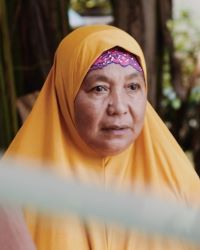Kalagan in Philippines

Photo Source:
Heather Smith Ebio
|
Send Joshua Project a map of this people group.
|
| People Name: | Kalagan |
| Country: | Philippines |
| 10/40 Window: | No |
| Population: | 102,000 |
| World Population: | 102,000 |
| Primary Language: | Kalagan |
| Primary Religion: | Islam |
| Christian Adherents: | 0.01 % |
| Evangelicals: | 0.01 % |
| Scripture: | New Testament |
| Ministry Resources: | Yes |
| Jesus Film: | Yes |
| Audio Recordings: | Yes |
| People Cluster: | Filipino, Muslim |
| Affinity Bloc: | Malay Peoples |
| Progress Level: |
|
Introduction / History
The Kalagan live on the island of Mindanao in the southern Philippines. They are located in an area between the interior uplands and the western coast of the Davao Gulf. These Kalagan are mainly of the Tagakaolo Kalagan branch. They converted to Islam either through intermarriage or through contact with their close neighbors, the Maguindanao.
The Kalagan are thought to be one of various groups of lowland Filipinos who came to the islands from Asia's southwestern mainland several thousand years ago. Their lifestyle and culture are very similar to that of the Maguindanao. Their language, also called Kalagan, resembles a number of other languages in the region.
While some Kalagan receive wages for labor, others are "slash and burn" farmers. Maize is the major crop grown and is harvested two or three times a year. The coastal Kalagan are also fishermen, and some are plantation workers.
What Are Their Lives Like?
The Kalagan are farmers who grow their own food. Maize is their major crop, and they harvest it two or three times throughout the year. Rice is a close second in terms of importance. Yams and sweet potatoes are also staple crops. They also grow vegetables such as squash, tomatoes, beans and the always abundant coconuts. They eat many tropical fruits. They raise goats and chickens for meat. From the nearby marshes they fish and find valuable materials for basketweaving, etc.
Many household items are hand crafted from wood, bamboo, rattan, thatch and fiber. Most of these are for personal use, but some woven items, mats and baskets are made for commercial sale.
Their art involves basket weaving and simple jewelry. During festive times the Kalagan have their women dancing to the rhythm of gongs and other instruments.
The Kalagan social structure is unusual because it is modified by a system of social rank, certain rules of descent, and distinctive patterns of marriage. Social rank is generally less important than blood ties. Higher-ranking families maintain elaborate genealogies to prove their descent. These high ranking families leave manual labor to those of lower status.
Kalagan marriages are usually monogamous (having only one spouse). Although polygyny (having more than one wife) is permitted, it is practiced only by those of high rank and wealth. There is a strong preference for marriage between related families, especially to second cousins. Newlywed couples usually live with the husband's family. In recent years couples are starting to have their own independent households.
What Are Their Beliefs?
The Kalagan were not introduced to Islam until Muslim missionaries arrived in the area during the 1500s. About half of the entire group of Kalagan came under Islamic influence at that time. Muslim religious leaders and teachers (imams and panditas) direct religious life and teach young boys to read and memorize the Koran (Islam's holy book). Muslim holidays and other observances are celebrated to varying degrees.
However, many of the Kalagan remained animists (believe that non-human objects have spirits). Today, many are still ethnic religionists, believing in the traditions and religions of their forefathers. They continue to believe in a variety of environmental spirits. They believe in magic, sorcery and supernatural beings.
What Are Their Needs?
Audio evangelistic materials in their own language are very much needed to win them to Christ. These might be hard to obtain.
Prayer Points
Ask the Lord of the harvest to send forth laborers to minister among the Kalagan of the Philippines.
Pray that Christian radio broadcasts and evangelical literature will become easily available to the Kalagan.
Pray for the Lord to send dreams and visions to Kalagan family leaders, opening entire families to the King of kings.